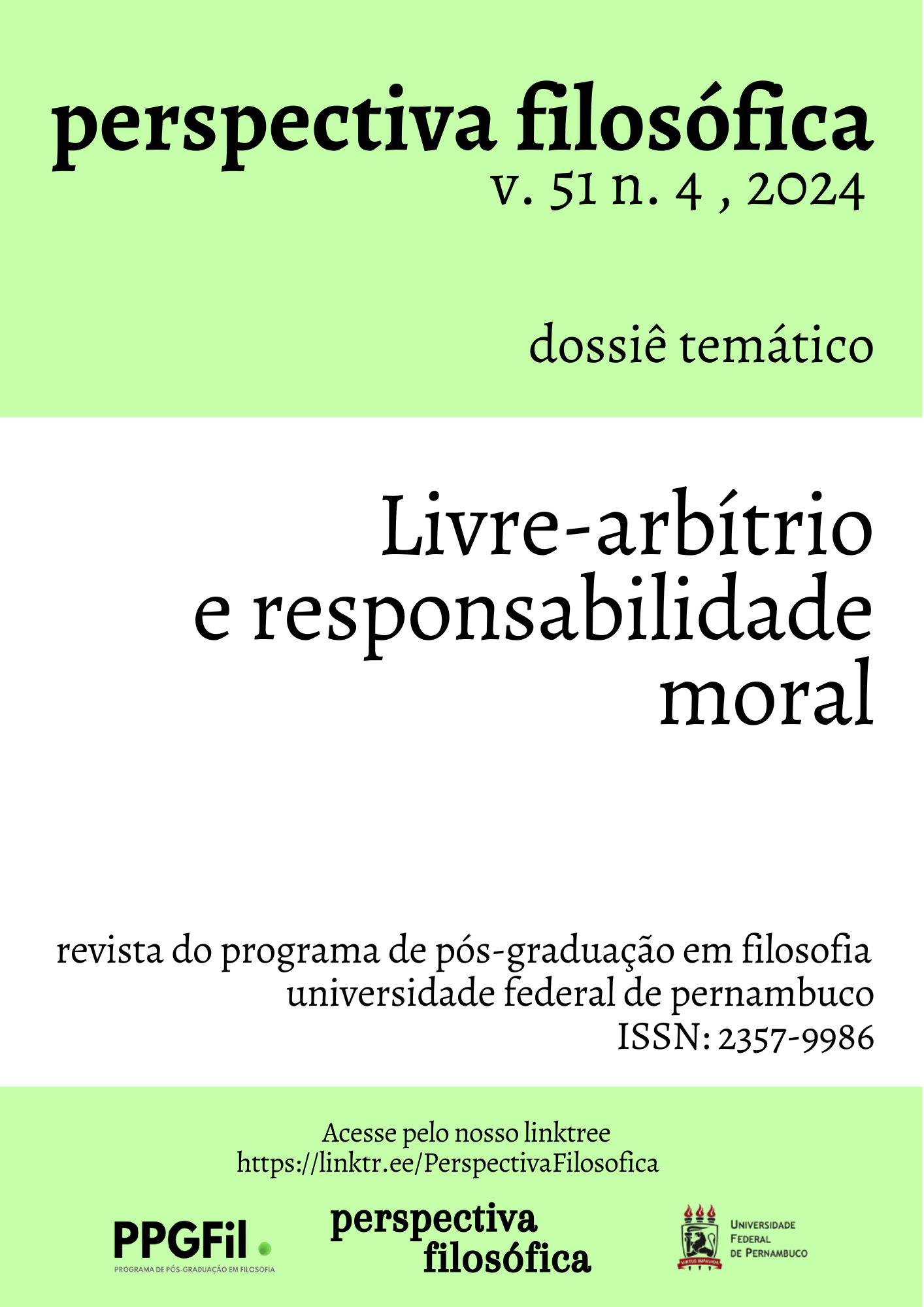Um argumento epistêmico transcendental em favor do livre-arbítrio
DOI:
https://doi.org/10.51359/2357-9986.2024.260448Palabras clave:
internismo, livre-arbitrio, determinismo, transcendental, A ética da crençaResumen
O objetivo deste artigo é apresentar um argumento epistêmico transcendental em favor do livre-arbítrio. Primeiro, contudo, irei caracterizar os conceitos de livre-arbítrio e determinismo. Em seguida, discutirei um pouco sobre a noção de internismo, de responsabilidade intelectual e de acesso epistêmico. Na parte principal, defenderei que o livre-arbítrio é uma condição necessária para certo tipo de pensamento racional e para a responsabilidade epistêmica. Não se segue daí que o livre-arbítrio seja uma condição necessária para todo tipo de racionalidade, mas defenderei que ele é uma condição necessária para a racionalidade do tipo internista que exige responsabilidade intelectual. Por fim, argumentarei que, se o determinismo for verdadeiro, os deterministas não poderiam justificar epistemicamente suas crenças e declarações, uma vez que, para a própria crença no determinismo ser racionalmente justificada, ela deve pressupor uma concepção robusta de livre-arbítrio. Se isso estiver correto, o determinismo é epistemicamente indefensável.
Citas
ALLISON, Henry. Kant’s Refutation of Materialism. The Monist, v. 72, n. 2, 1989, p. 190-208.
ALSTON, William P. Concepts of Epistemic Justification. The Monist, v. 68, n. 1, 1985, p. 57-89.
ANDREWS, Kristin. Cognição Animal. In: CARVALHO, Eros Moreira (org.). Textos Selecionados de Filosofia da Cognição. Série Investigações Filosóficas. Pelotas: Editora da Universidade Federal de Pelotas, 2022, p. 327-419.
BIGNON, Guillaume. Calvinismo e Determinismo: uma avaliação calvinista do determinismo, da responsabilidade moral e do envolvimento divino com o mal. São Paulo: Editora Carisma, 2022.
BLACKBURN, Simon. Dicionário Oxford de Filosofia. Rio de Janeiro: Zahar, 1997.
BOYLE, Joseph M.; GRISEZ, Germain; TOLLEFSEN, Olaf. Determinism, Freedom, and Self-Referential Arguments. Review of Metaphysics, v. 26, n. 1, 1972, p. 3-37.
CARROLL, John. As Leis da Natureza. In: MERLUSSI, Pedro (org.). Textos Selecionados de Metafísica. Série Investigações Filosóficas. Pelotas: Editora da Universidade Federal de Pelotas, 2021.
CHISHOLM, Roderick M. Perceiving: A Philosophical Study. Ithaca: Cornell University Press, 1957.
CLIFFORD, W. A ética da crença. Cadernos UFS Filosofia, Fasc. XIII, n. 8, ago-dez. 2010.
COPP, D. ‘Ought’ implies ‘can’, blameworthiness, and alternative possibilities. In: WIDERKER, D.; MCKENNA, M. (eds.). Freedom, Responsibility and Agency: Essays on the Importance of Alternative Possibilities. Aldershot: Ashgate Press, 2003, p. 265-299.
EPICURO. Sentenças Vaticanas. Tradução e comentário de João Quartim de Moraes. São Paulo: Loyola, 2014.
GOLDMAN, Alvin I. A causal theory of knowing. Journal of Philosophy, v. 64, n. 12, 1967, p. 357-372.
HASKER, William. The Transcendental Refutation of Determinism. Southern Journal of Philosophy, v. 11, n. 3, 1973, p. 175-183.
HOOKWAY, Christopher. The epicurean argument: Determinism and scepticism. Inquiry: An Interdisciplinary Journal of Philosophy, v. 32, n. 1, 1989, p. 79-104.
JORDAN, James N. Determinism's Dilemma. Review of Metaphysics, v. 23, n. 1, 1969, p. 48-66.
KANE, Robert. A Contemporary Introduction to Free Will. New York: Oxford University Press, 2005.
LOCKIE, Robert. Free Will and Epistemology: A Defence of the Transcendental Argument for Freedom. London, UK: Bloomsbury Academic, 2018.
MENUGE, Angus. The Ontological Argument from Reason. Philosophia Christi, v. 13, n. 1, 2011, p. 59-74.
O'CONNOR, Timothy; FRANKLIN, Christopher Evan. Free will. Stanford Encyclopedia of Philosophy, 2022. Disponível em: <https://plato.stanford.edu/entries/freewill/>. Acesso em 11 jun. 2024.
PLANTINGA, Alvin. Warrant: The Current Debate. New York: Oxford University Press, 1993.
PLANTINGA, Alvin. Ciência, Religião e Naturalismo: onde está o conflito? São Paulo: Vida Nova, 2018.
QUINN, Philip L. Epistemic parity and religious argument. Philosophical Perspectives, v. 5, 1991, p. 317-341.
REID, Thomas. Inquiry and Essays. Edited by Keith Lehrer & Ronald E. Beanblossom. Indianapolis: Hackett Publishing Company, 1983.
ROBERTS, Robert; JAY WOOD, W. Intellectual Virtues: An Essay in Regulative Epistemology. Oxford: Oxford University Press, 2007.
SLAGLE, Jim. The Epistemological Skyhook: Determinism, Naturalism, and Self-Defeat. New York: Routledge, 2016.
STENMARK, Mark. Como Relacionar Ciência e Religião: Um Modelo Multidimensional. São Paulo: Reflexão, 2021.
SOSA, Ernest. Epistemologia da Virtude: crença apta e conhecimento reflexivo. São Paulo: Loyola, 2013.
SWINBURNE, Richard. Faith and reason. New York: Oxford University Press, 2005.
VAN INWAGEN, Peter. The Incompatibility of Free Will and Determinism. Philosophical Studies, v. 27, n. 3, 1975, p. 185-199.
VAN INWAGEN, Peter. The Incompatibility of Responsibility and Determinism. Bowling Green Studies in Applied Philosophy, v. 2, 1980, p. 30-37.
VAN INWAGEN, Peter. An Essay on Free Will. New York: Oxford University Press, 1983.
VAN INWAGEN, Peter. O problema do mal. Brasília: Editora UnB, 2018.
VIHVELIN, Kadri. Argumentos a favor do Incompatibilismo. In: MERLUSSI, Pedro (org.). Textos Selecionados de Metafísica. Série Investigações Filosóficas. Pelotas: Editora da Universidade Federal de Pelotas, 2021.
WICK, Warner. Truth's debt to freedom. Mind, v. 73, n. 292, 1964, p. 527-537.
Descargas
Publicado
Número
Sección
Licencia
Derechos de autor 2024 Bruno Ribeiro

Esta obra está bajo una licencia internacional Creative Commons Atribución 4.0.
A Revista Perspectiva Filosófica orienta seus procedimentos de gestão de artigos conforme as diretrizes básicas formuladas pelo Conselho Nacional de Desenvolvimento Científico e Tecnológico (CNPq). http://www.cnpq.br/web/guest/diretrizesAutores que publicam nesta revista concordam com os seguintes termos:
Os autores mantém os direitos autorais e concedem à revista o direito de primeira publicação, sendo o trabalho simultaneamente licenciado sob https://creativecommons.org/licenses/by/4.0/deed.pt_BR que permite o compartilhamento do trabalho com reconhecimento da autoria e publicação inicial nesta revista.
Os autores têm autorização para assumir contratos adicionais separadamente, para distribuição não-exclusiva da versão do trabalho publicada nesta revista, com reconhecimento de autoria e publicação inicial nesta revista (Consultar http://opcit.eprints.org/oacitation-biblio.html).

Esta revista está licenciada com uma Licença Creative Commons Atribuição 4.0 Internacional.













